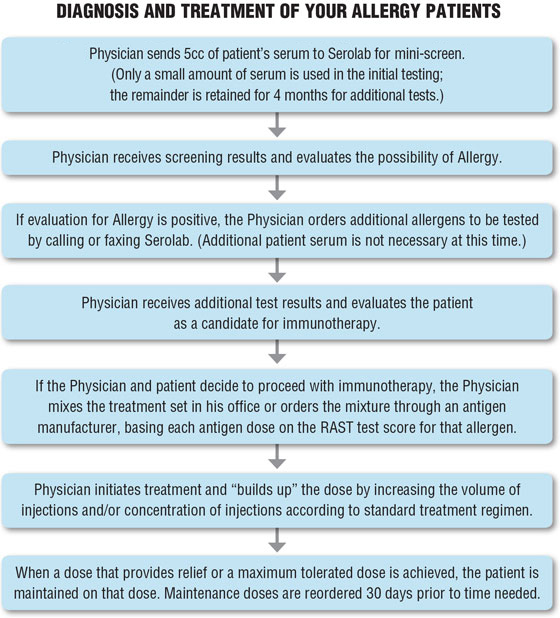Allergy Immunology Service
Allergy Immunology Service
RAST SYSTEM FOR THE DIAGNOSIS AND TREATMENT OF ALLERGIES
Mini-Screen
The mini-screen technique involves testing a patient for 7 to 10 selected allergens. Individual RAST tests for representatives of tree pollens, weed pollens, grass pollens, mite and a major mold are easily selected for different regions to comprise a mini-screen. When at least 8 allergens are used for the mini-screen, efficiency and sensitivity of the test are both in excess of 95%.
If all responses on the mini-screen are negative, further RAST testing is not indicated. Positive response to pollens but not to mite or molds would indicate further testing of pollens only; the reverse is true if positive responses are observed in only mite and molds.
One of the major advantages of the mini-screen is the efficiency when positive test results are received. Only additional allergens need be tested. The results of the mini-screen tests can later be used for calculation of initial doses for immunotherapy after further testing is performed on the additional allergens.

Patient Work Up (Battery)
Most Physicians complete the allergic patient’s work-up with a battery of RAST tests in the range of 20-25 total allergens, (depending on screen indications) plus a Total IgE. The initial use of a screen provides the Physician with confidence that results from the final battery will be positive. The specific antigens, and each antigen concentration appropriate for treatment are easily determined from the RAST test results.
Patient Treatment Sets
It has been repeatedly demonstrated that specific immunotherapy for Allergy is far superior to any other type of immunotherapy. This means the best chance for successful immunotherapy, (thus patient satisfaction) is by tailoring the treatment mixture according to the patient’s level of sensitivity to each specific allergen. Some commercial laboratories do not offer treatment sets formulated according to the patient’s allergen sensitivity levels, but instead, include all antigens shown to be positive by RAST in the mixture at the same volumes and/or the same concentrations. Use of a general immunotherapy program as described negates the need for determining the level of sensitivity of the patient to each allergen but can result in a high rate of immunotherapy failures.
Once the final battery of tests is complete, then the Physician can mix the treatment set in his office or order the antigen mixture in the appropriate concentrations using the RAST results as a guide. When the treatment set has been prepared it is recommended that a “vial test” (intradermal skin test) be applied prior to subcutaneous injection of the first dose as a safety test. Technical assistance and literature for formulation of treatment sets, “vial testing,” and dosing regimen are available from Serolab.

